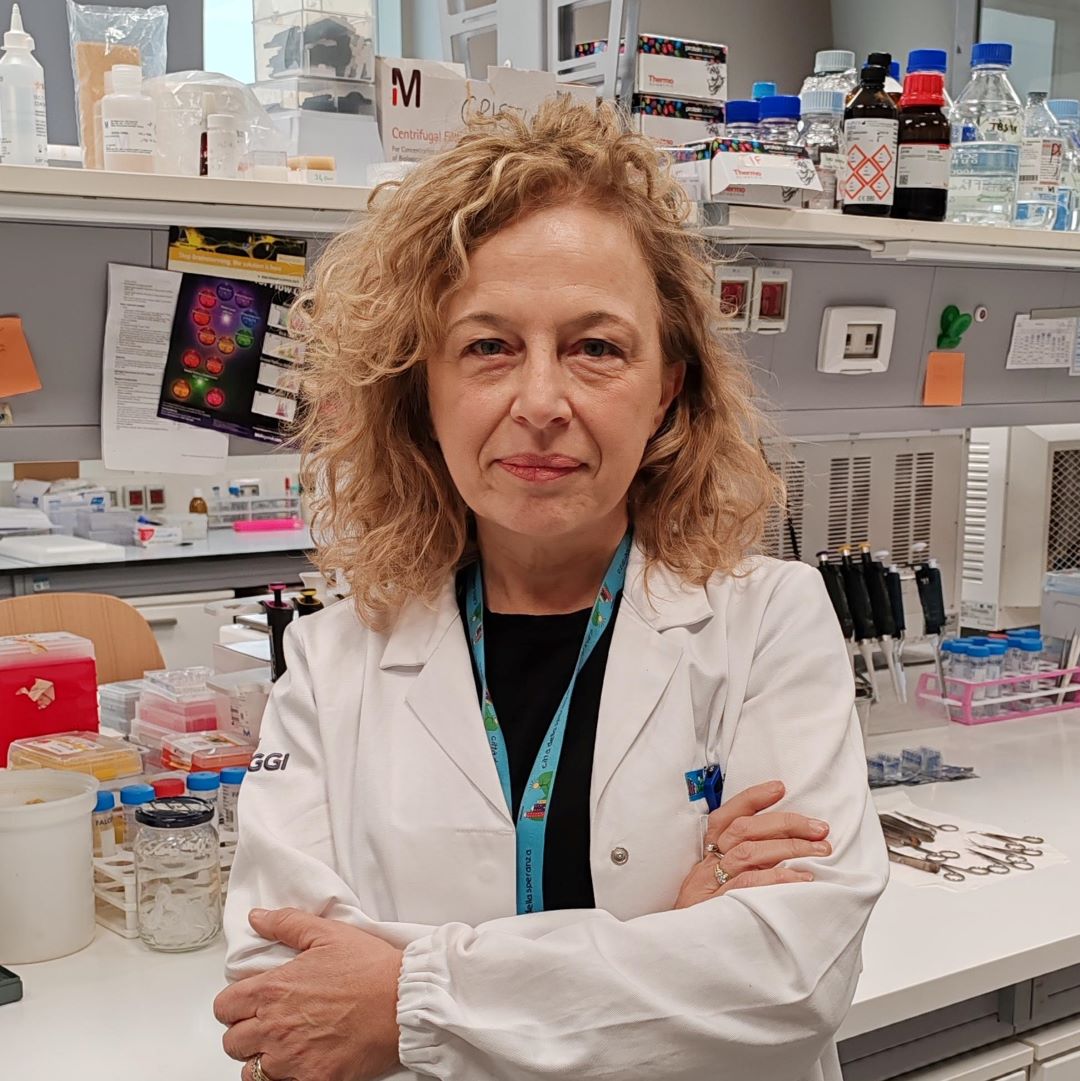Immunology and Neuroimmunology Area
Immunity, Inflammation & Angiogenesis
Research Activity
Immunity, Inflammation & Angiogenesis Laboratory studies signals modulating angiogenesis, inflammation and immunity in various physiopathological conditions.
Exploiting MSC-derived EVs to fight cancer
Pathological angiogenesis is a hallmark of several conditions including eye diseases, inflammatory diseases, and cancer. Stromal cells play a crucial role in regulating angiogenesis through the release of soluble factors or direct contact with endothelial cells. We analyzed the properties of extracellular vesicles (EVs) released by bone marrow mesenchymal stromal cells (MSCs) and explored the possibility of using them to therapeutically target angiogenesis. We demonstrated (Angioni et al. JEV 2020) that in response to pro-inflammatory cytokines, MSCs produce EVs that are enriched in TIMP-1, CD39 and CD73 and inhibit angiogenesis targeting both extracellular matrix remodelling and endothelial cell migration. Our final goal is to exploit the anti-angiogenic EVs to target pathological tumor associated angiogenesis.
Collaborators: Maurizio Muraca, University of Padua & IRP.
Fostering Cancer Immunotherapy for the treatment of pediatric Lymphomas
The current standard-of-care for pediatric B non-Hodgkin Lymphomas (B-NHL) with standard-risk and high-risk disease results in more than 94% 5-year EFS. Nonetheless, even today, the long-term survival for patients with relapsed or refractory disease is poor. CAR T therapy has come out as one of the most effective options in the treatment of B-cell acute lymphoblastic leukemia and adult B-cell lymphomas and a multicentric trial has been recently approved in pediatric patients with relapsed or refractory B-NHLs. Even so, the available clinical experience has shown that 30-60% patients relapse after treatment, probably due to CAR T incomplete responses, downregulation of tumor-related antigens and immune escape mechanisms in the hosts, which is a great challenge for disease control. Therefore, understanding the mechanisms that underlie post-CAR T relapse and establishing corresponding prevention and treatment strategies is of paramount urgency. Of note, the induction of a tolerogenic environment made up by myeloid immunosuppressive cell subsets so far is one of the major obstacles that CAR T cells need to circumvent to fully accomplish their job. The metabolic landscape of the tumor microenvironment (TME) has recently turned out as a key determinant of anti-tumor immunity and therapy effectiveness. Our research priority will be the investigation of the metabolic crosstalk within B-NHL environment in children with the specific aim of identifying leading metabolic checkpoints that can hamper CAR T cell responses. As state-of-the-art approach, we will investigate myeloid regulatory cell immunosuppressive signature at single-cell level.
Collaborators: Lara Mussolin Unipd & IRP, Elisa Cimetta Unipd & IRP, Alessandra Castegna University of Bari
Multiple sclerosis and acquired autoimmune demyelinating syndromes
Acquired demyelinating diseases of the central nervous systems (CNS) constitute a broad spectrum of highly disabling inflammatory and neurodegenerative diseases. Multiple sclerosis (MS) and the so-called Neuromyelits Optica-Spectrum Disorders (NMO-SD), whose incidence and prevalence are dramatically increasing worldwide, may have a pediatric onset, characterized by severe clinical and neuroradiological pictures. The aim of our project is the discovery of still unknown immunopathogenic mechanisms in pediatric MS through: i) a comprehensive, single-cell multi-omics analysis of the pathogenic cell populations; ii) the identification of possible target antigens, and iii) the identification of novel antigens through T cell receptor (TCR) and HLA profiling.
Collaborators: Paolo Gallo, Stefano Sartori, University of Padua & IRP
Monoamine Oxidases in Innate Immunity
Reactive oxygen species (ROS) are fundamental for macrophages to kill invasive microorganisms. Moreover, they have a key role in regulating signal transduction pathways, gene expression and differentiation. Besides NADPH oxidase, mitochondria are gaining increasing relevance as a source of ROS in immune cells, although the exact sites of formation are still unclear. Monoamine oxidase (MAO) is a relevant source of hydrogen peroxide in mitochondria, generated by oxidative deamination of amines. Since this enzyme has been scarcely characterized in phagocytic cells, we aimed at clarifying its role in innate immunity and in the activation of the NLRP inflammasome. The uncontrolled activation of the inflammasome drives progression of inflammatory, metabolic, and neurodegenerative disorders. However, it is still unclear what is the specific role of mitochondrial ROS in NLRP3 triggering. We show that oxidative stress induced by MAO activity plays a crucial role in inflammasome activation in acute and chronic inflammation. Mechanistically, MAO-B-dependent ROS formation caused mitochondrial dysfunction and NF-kB induction, resulting in NLRP3 and pro-IL-1b overexpression. Both in vitro and in vivo, MAO-B inhibition by rasagiline prevented IL-1b secretion and MAO-B deficient mice showed impaired response to LPS-mediated endotoxemia. Importantly, in a Duchenne dystrophy model, rasagiline administration reduced inflammasome activation in muscle-infiltrating macrophages, along with muscle performance recovery. Our findings identify MAO-B as a specific producer of mitochondrial ROS fuelling NLRP3 inflammasome, thereby providing the basis for repurposing MAO-B inhibitors to treat inflammasome-mediated pathologies. Thus, we are currently investigating whether clinical-grade monoamine oxidase inhibitors can be viable candidates in the treatment of autoinflammatory and autoimmune disorders.
Collaborators: Rosella Tomanin IRP, Libero Vitiello Unipd, Bert Blaauw Unipd, Wolfgang Jerolimek, Pharmaxis, Australia
Team Members
Prof. Marcella Canton – Co-Principal Investigator
Prof. Barbara Molon – Co-Principal Investigator
Dr. Roberta Angioni – Senior Scientist
Dr. Francisca Venegas Celedón – Post Doc
Dr. Alessandra Maria Testa – Research Fellow
Dr. Annachiara Marin – PhD Student
Dr. Elena Baldisseri – PhD Student
Selected Publications
• Angioni R, Bonfanti M, Caporale N, Sánchez-Rodríguez R, Munari F, Savino A, Pasqualato S, Buratto D, Pagani I, Bertoldi N, Zanon C, Ferrari P, Ricciardelli E, Putaggio C, Ghezzi S, Elli F, Rotta L, Scardua A, Weber J, Cecatiello V, Iorio F, Zonta F, Cattelan AM, Vicenzi E, Vannini A, Molon B, Villa CE, Viola A, Testa G. RAGE engagement by SARS-CoV-2 enables monocyte infection and underlies COVID-19 severity. Cell Rep Med. 2023 Nov 21;4(11):101266. doi: 10.1016/j.xcrm.2023.101266. Epub 2023 Nov 8. PMID: 37944530; PMCID: PMC10694673.
• Angioni R, Sánchez-Rodríguez R, Munari F, Bertoldi N, Arcidiacono D, Cavinato S, Marturano D, Zaramella A, Realdon S, Cattelan A, Viola A, Molon B. Age-severity matched cytokine profiling reveals specific signatures in Covid-19 patients. Cell Death Dis. 2020 Nov 6;11(11):957. doi: 10.1038/s41419-020-03151-z. PMID: 33159040; PMCID: PMC7646225.
• Venegas FC, Sánchez-Rodríguez R, Luisetto R, Angioni R, Viola A, Canton M. Oxidative Stress by the Mitochondrial Monoamine Oxidase B Mediates Calcium Pyrophosphate Crystal-Induced Arthritis. Arthritis Rheumatol. 2024 Feb;76(2):279-284. doi: 10.1002/art.42697. Epub 2023 Dec 21. PMID: 37695218.
• Damanti CC, Ferrone L, Gaffo E, Garbin A, Tosato A, Contarini G, Gallingani I, Angioni R, Molon B, Borile G, Carraro E, Pillon M, Scarmozzino F, Dei Tos AP, Pizzi M, Ciscato F, Rasola A, Biffi A, Bortoluzzi S, Lovisa F, Mussolin L. Plasma small-extracellular vesicles enriched in miR-122-5p promote disease aggressiveness in pediatric anaplastic large-cell lymphoma. Cancer Commun (Lond). 2023 May;43(5):630-634. doi: 10.1002/cac2.12415. Epub 2023 Apr 4. PMID: 37014813; PMCID: PMC10174085.
• Sánchez-Rodríguez R, Tezze C, Agnellini AHR, Angioni R, Venegas FC, Cioccarelli C, Munari F, Bertoldi N, Canton M, Desbats MA, Salviati L, Gissi R, Castegna A, Soriano ME, Sandri M, Scorrano L, Viola A, Molon B. OPA1 drives macrophage metabolism and functional commitment via p65 signaling. Cell Death Differ. 2023 Mar;30(3):742-752. doi: 10.1038/s41418-022-01076-y. Epub 2022 Oct 28. PMID: 36307526; PMCID: PMC9984365.


